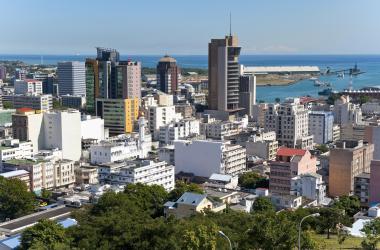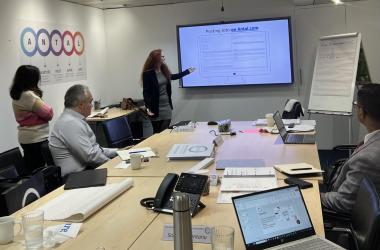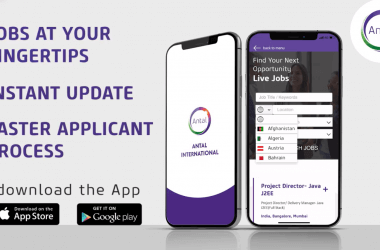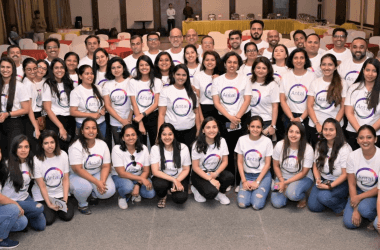-
![]() UK’s Immigration Overhaul 2025: What It Means for Employers and Migrants
By Antal International
UK’s Immigration Overhaul 2025: What It Means for Employers and Migrants
By Antal International
-
![]() Cybersecurity: A Strategic Priority for Businesses and Recruiters in 2025
By Philippe Bildé
Cybersecurity: A Strategic Priority for Businesses and Recruiters in 2025
By Philippe Bildé
-
![]() The Impact of Tech Layoffs on Innovation: Navigating the New Normal
By Antal International
The Impact of Tech Layoffs on Innovation: Navigating the New Normal
By Antal International
-
![]() The Hidden Power of Internal Mobility: How to Get Ahead Without Changing Jobs
By Antal International
The Hidden Power of Internal Mobility: How to Get Ahead Without Changing Jobs
By Antal International
-
![]() Servitization: Transforming the Automotive Industry and What It Means for Talent
By Hilton Ralph
Servitization: Transforming the Automotive Industry and What It Means for Talent
By Hilton Ralph
-
![]() Navigating the New Employment Equity Targets in South Africa: What It Means for the Insurance Sector
By Vicki Bedeman
Navigating the New Employment Equity Targets in South Africa: What It Means for the Insurance Sector
By Vicki Bedeman
-
![]() How Antal Helped One of North America's Fastest Growing Company Scale in India in Just 9 Months
By Vinu Nair
How Antal Helped One of North America's Fastest Growing Company Scale in India in Just 9 Months
By Vinu Nair
-
![]() "Career Catfishing": Navigating the New Job Market Phenomenon
By Antal International
"Career Catfishing": Navigating the New Job Market Phenomenon
By Antal International
-
![]() How Pioneering Tech Companies Can Effectively Recruit Top-Class Executives and Critical Talent
By Peter Wharton
How Pioneering Tech Companies Can Effectively Recruit Top-Class Executives and Critical Talent
By Peter Wharton
-
![]() Data Scientists - their Importance to SaaS Vendors and How to Hire the Best Talent
By Peter Wharton
Data Scientists - their Importance to SaaS Vendors and How to Hire the Best Talent
By Peter Wharton
-
![]() How to Answer “Tell Me About Yourself” Without Sounding Like Everyone Else
By Antal International
How to Answer “Tell Me About Yourself” Without Sounding Like Everyone Else
By Antal International
-
![]() Why Your Hiring Strategy Isn’t Working - And How to Fix It
By Antal International
Why Your Hiring Strategy Isn’t Working - And How to Fix It
By Antal International
-
![]() Quiet Promotions: The Hidden Career Trap and How to Avoid It
By Antal International
Quiet Promotions: The Hidden Career Trap and How to Avoid It
By Antal International
-
![]() The Career Snowball Effect: How Small Wins Lead to Big Success
By Antal International
The Career Snowball Effect: How Small Wins Lead to Big Success
By Antal International
-
![]() Navigating the Talent Landscape in Renewables & Energy - MENA & India
By Zeeshan Naglekar
Navigating the Talent Landscape in Renewables & Energy - MENA & India
By Zeeshan Naglekar
-
![]() The Great Return: Why Employees Are Pushing Back Against Office Mandates
By Antal International
The Great Return: Why Employees Are Pushing Back Against Office Mandates
By Antal International
-
![]() Bridging the Gender Gap: Why Equal Pay Still Isn’t a Reality
By Antal International
Bridging the Gender Gap: Why Equal Pay Still Isn’t a Reality
By Antal International
-
![]() Should You Apply for an Internal Promotion or Look Elsewhere?
By Antal International
Should You Apply for an Internal Promotion or Look Elsewhere?
By Antal International
-
![]() GCCs in India Are Evolving Beyond IT to Innovation & Strategy
By Antal International
GCCs in India Are Evolving Beyond IT to Innovation & Strategy
By Antal International
-
![]() Why Work with a Specialized Recruiter in 2025 for the Telecom, IT, Tech & ICT Industry?
By Philippe Bildé
Why Work with a Specialized Recruiter in 2025 for the Telecom, IT, Tech & ICT Industry?
By Philippe Bildé
-
![]() The Hidden Cost of Staying in the Wrong Job Too Long
By Antal International
The Hidden Cost of Staying in the Wrong Job Too Long
By Antal International
-
![]() Organisational Implications of Product-Led Growth vs. Sales-Led Growth in Tech Companies
By Peter Wharton
Organisational Implications of Product-Led Growth vs. Sales-Led Growth in Tech Companies
By Peter Wharton
-
![]() Executive Hiring for HR SaaS Product Management
By Peter Wharton
Executive Hiring for HR SaaS Product Management
By Peter Wharton
-
![]() Hiring Product Managers for a hyper-growth tech unicorn
By Peter Wharton
Hiring Product Managers for a hyper-growth tech unicorn
By Peter Wharton
-
![]() Should Sales and Marketing Operations Be Combined?
By Peter Wharton
Should Sales and Marketing Operations Be Combined?
By Peter Wharton
-
![]() Defining the Perfect Organisational Setup for Tech Scale-Up Companies
By Peter Wharton
Defining the Perfect Organisational Setup for Tech Scale-Up Companies
By Peter Wharton
-
![]() How to Have a Tough Conversation at Work
By Antal International
How to Have a Tough Conversation at Work
By Antal International
-
![]() London FinTech Scale-Up – Navigating Complex Hiring for a Senior Business Operations Leader in Singapore
By Ramkumar Narayanan
London FinTech Scale-Up – Navigating Complex Hiring for a Senior Business Operations Leader in Singapore
By Ramkumar Narayanan
-
![]() 7 Concrete Steps to Land Your Next Promotion
By Antal International
7 Concrete Steps to Land Your Next Promotion
By Antal International
-
![]() Top 5 Fintech Trends to Watch in 2025
By Imo Etuk
Top 5 Fintech Trends to Watch in 2025
By Imo Etuk
-
![]() The Hidden Job Market: How to Find Opportunities Before They’re Advertised
By Antal International
The Hidden Job Market: How to Find Opportunities Before They’re Advertised
By Antal International
-
![]() Navigating the Talent Challenge: Recruiting Top Leadership for Tech Scale-Ups
By Peter Wharton
Navigating the Talent Challenge: Recruiting Top Leadership for Tech Scale-Ups
By Peter Wharton
-
![]() Hiring a Head of Financial Risks in a Namibian Bank
By Imo Etuk
Hiring a Head of Financial Risks in a Namibian Bank
By Imo Etuk
-
![]() Building Market Success with a Petrochemical Sales Executive in Uganda
By James Njeke
Building Market Success with a Petrochemical Sales Executive in Uganda
By James Njeke
-
![]() Hiring a CUO for a Reinsurance Company in Mauritius
By Vicki Bedeman
Hiring a CUO for a Reinsurance Company in Mauritius
By Vicki Bedeman
-
![]() Hiring a CFO for an African Reinsurer
By Vicki Bedeman
Hiring a CFO for an African Reinsurer
By Vicki Bedeman
-
![]() Mastering Your Job Interview Case Study Presentation for Success
By Peter Wharton
Mastering Your Job Interview Case Study Presentation for Success
By Peter Wharton
-
![]() Unveiling the Key Traits of an Exceptional Chief Product Officer (CPO)
By Peter Wharton
Unveiling the Key Traits of an Exceptional Chief Product Officer (CPO)
By Peter Wharton
-
![]() Navigating Niche Job Markets
By Antal International
Navigating Niche Job Markets
By Antal International
-
![]() Why Employer Flexibility is the Ultimate Hiring Strategy in 2025
By Antal International
Why Employer Flexibility is the Ultimate Hiring Strategy in 2025
By Antal International
-
![]() How India’s GCC Revolution is Driving a $50 Billion Economic Output by 2029
By Antal International
How India’s GCC Revolution is Driving a $50 Billion Economic Output by 2029
By Antal International
-
![]() From Post-Holiday Slowdown into New Year Motivation
By Antal International
From Post-Holiday Slowdown into New Year Motivation
By Antal International
-
![]() 5 Tips to Start the New Year on a High Note
By Antal International
5 Tips to Start the New Year on a High Note
By Antal International
-
![]() Jobs on the Rise in 2025: Careers to Watch and How to Prepare
By Sugandha Aggarwal
Jobs on the Rise in 2025: Careers to Watch and How to Prepare
By Sugandha Aggarwal
-
![]() From Novice to Expert - How Antal Training Prepares Franchisees for Success
By Antal International
From Novice to Expert - How Antal Training Prepares Franchisees for Success
By Antal International
-
![]() The Power of Transferable Skills: Using Your Experience for a Career Change
By Antal International
The Power of Transferable Skills: Using Your Experience for a Career Change
By Antal International
-
![]() Kickstart Your Job Search for 2025: 5 Tips to Stand Out in the New Year
By Antal International
Kickstart Your Job Search for 2025: 5 Tips to Stand Out in the New Year
By Antal International
-
![]() The Art of Personal Branding
By Antal International
The Art of Personal Branding
By Antal International
-
![]() Insights from AGC: A Global Hub for Collaboration and Inspiration
By Antal International
Insights from AGC: A Global Hub for Collaboration and Inspiration
By Antal International
-
![]() Unlock Crucial Job Search Secrets: Stats to Power Your Success
By Antal International
Unlock Crucial Job Search Secrets: Stats to Power Your Success
By Antal International
-
![]() From Workshop Floor to Digital Dashboard: Our Industry's Biggest Evolution Yet
By Hilton Ralph
From Workshop Floor to Digital Dashboard: Our Industry's Biggest Evolution Yet
By Hilton Ralph
-
![]() Network Your Way to the Job You Want: 5 Simple Tips
By Antal International
Network Your Way to the Job You Want: 5 Simple Tips
By Antal International
-
![]() Connected to Succeed: Driving Success Through Collaboration
By Antal International
Connected to Succeed: Driving Success Through Collaboration
By Antal International
-
![]() Overcoming Micromanagement for a Healthier Work Environment
By Antal International
Overcoming Micromanagement for a Healthier Work Environment
By Antal International
-
![]() Connected to Succeed: Launching a Recruitment Business with Antal
By Antal International
Connected to Succeed: Launching a Recruitment Business with Antal
By Antal International
-
![]() The HR Innovator: Creating Unforgettable Experiences, Sustainability and long term impact
By Vanesa Zlatanova
The HR Innovator: Creating Unforgettable Experiences, Sustainability and long term impact
By Vanesa Zlatanova
-
![]() How The HR Innovator Helps HR Professionals Stay Ahead of Industry Shifts and Trends
By Vanesa Zlatanova
How The HR Innovator Helps HR Professionals Stay Ahead of Industry Shifts and Trends
By Vanesa Zlatanova
-
![]() How the venture HR Innovator is created
By Vanesa Zlatanova
How the venture HR Innovator is created
By Vanesa Zlatanova
-
![]() Employee Well-being: Holistic Approaches to Mental, Physical, and Emotional Health in the Workplace
By Vanesa Zlatanova
Employee Well-being: Holistic Approaches to Mental, Physical, and Emotional Health in the Workplace
By Vanesa Zlatanova
-
![]() Global Hiring Trends in the Chemicals Industry: A Conversation with Uwe
By James Njeke
Global Hiring Trends in the Chemicals Industry: A Conversation with Uwe
By James Njeke
-
![]() Succeeding in an Interview: Importance of Personality and Body Language
By Antal International
Succeeding in an Interview: Importance of Personality and Body Language
By Antal International
-
![]() What's coming in work trends for 2025—and How to prepare
By Antal International
What's coming in work trends for 2025—and How to prepare
By Antal International
-
![]() Providence - Overcoming Niche Recruitment Challenges in Hyderabad
By Vinu Nair
Providence - Overcoming Niche Recruitment Challenges in Hyderabad
By Vinu Nair
-
![]() Panasonic Avionics - Filling High-Volume Technological Roles in Pune
By Vinu Nair
Panasonic Avionics - Filling High-Volume Technological Roles in Pune
By Vinu Nair
-
![]() Health Insurance Client – Belgium
By Pierre Dagneau
Health Insurance Client – Belgium
By Pierre Dagneau
-
![]() Micromanage less, thrive more.. but how?
By Antal International
Micromanage less, thrive more.. but how?
By Antal International
-
![]() Saying no at work... Are you doing it wrong?
By Antal International
Saying no at work... Are you doing it wrong?
By Antal International
-
![]() What's the biggest difference between generations at work?
By Antal International
What's the biggest difference between generations at work?
By Antal International
-
![]() Is there really such a thing as a dream job?
By Antal International
Is there really such a thing as a dream job?
By Antal International
-
![]() Take the leap out of your comfort zone.
By Antal International
Take the leap out of your comfort zone.
By Antal International
-
![]() Why staying too long in your current job can hold you back
By Antal International
Why staying too long in your current job can hold you back
By Antal International
-
![]() Attracting and retaining the best talent in your organization
By Roxana Carabadache
Attracting and retaining the best talent in your organization
By Roxana Carabadache
-
![]() A Women’s Guide to Navigating the Job Market
By Vicki Bedeman
A Women’s Guide to Navigating the Job Market
By Vicki Bedeman
-
![]() What can the Olympics teach us about competing in the job market?
By Antal International
What can the Olympics teach us about competing in the job market?
By Antal International
-
![]() Want to land your next job? Search smarter, not harder.
By Antal International
Want to land your next job? Search smarter, not harder.
By Antal International
-
![]() How to follow up after an interview: with examples
By Antal International
How to follow up after an interview: with examples
By Antal International
-
![]() How to Ask Your Employer About Career Development and Progression
By Antal International
How to Ask Your Employer About Career Development and Progression
By Antal International
-
![]() The Rise of .NET Core Developers: Why They Are in High Demand
By Antal TECH jobs
The Rise of .NET Core Developers: Why They Are in High Demand
By Antal TECH jobs
-
![]() 4 mistakes that can sabotage your job search
By Antal International
4 mistakes that can sabotage your job search
By Antal International
-
![]() How to deal with toxic personalities at work
By Antal International
How to deal with toxic personalities at work
By Antal International
-
![]() Emotional Intelligence may make or break your next job interview
By Antal International
Emotional Intelligence may make or break your next job interview
By Antal International
-
![]() Going Beyond The Resume: The Holistic Candidate Evaluation
By James Njeke
Going Beyond The Resume: The Holistic Candidate Evaluation
By James Njeke
-
![]() 3 Questions to answer right to make your application stand out
By Antal International
3 Questions to answer right to make your application stand out
By Antal International
-
![]() Tackling Insurance Recruitment Challenges in Southern Africa
By Vicki Bedeman
Tackling Insurance Recruitment Challenges in Southern Africa
By Vicki Bedeman
-
![]() Simple ways to keep your top talent
By Antal International
Simple ways to keep your top talent
By Antal International
-
![]() 7 red flags you are not in the right role
By Antal International
7 red flags you are not in the right role
By Antal International
-
![]() The Surge in Demand for German-Speaking Sales & Marketing Staff in Spanish Companies
By Leticia de la Herran
The Surge in Demand for German-Speaking Sales & Marketing Staff in Spanish Companies
By Leticia de la Herran
-
![]() simple strategies to boost excitement at work for everyone
By Antal International
simple strategies to boost excitement at work for everyone
By Antal International
-
![]() Escape the "yes" trap and set healthy limits
By Antal International
Escape the "yes" trap and set healthy limits
By Antal International
-
![]() Leveraging tech innovations for effective hiring strategies
By Antal International
Leveraging tech innovations for effective hiring strategies
By Antal International
-
![]() An Investor Mindset VS An Entrepreneurial Mindset
By Antal International
An Investor Mindset VS An Entrepreneurial Mindset
By Antal International
-
![]() How to handle micromanagement
By Antal International
How to handle micromanagement
By Antal International
-
![]() How to simplify your job search
By Antal International
How to simplify your job search
By Antal International
-
![]() The Challenges and Promises of Recruitment in the Telecom ICT Industry in 2024
By Philippe Bildé
The Challenges and Promises of Recruitment in the Telecom ICT Industry in 2024
By Philippe Bildé
-
![]() Les défis et les promesses du recrutement dans l'industrie des télécommunications et des TIC en 2024
By Philippe Bildé
Les défis et les promesses du recrutement dans l'industrie des télécommunications et des TIC en 2024
By Philippe Bildé
-
![]() How to conduct thorough company research before applying for a job
By Antal International
How to conduct thorough company research before applying for a job
By Antal International
-
![]() how to be more innovative at work!
By Antal International
how to be more innovative at work!
By Antal International
-
![]() AI: Exploring the Risks and Challenges of Its Use
By Vanesa Zlatanova
AI: Exploring the Risks and Challenges of Its Use
By Vanesa Zlatanova
-
![]() Starting a new job? Answer these 4 questions.
By Antal International
Starting a new job? Answer these 4 questions.
By Antal International
-
![]() Embracing the Present: The Impact of AI on the HR Sector
By Vanesa Zlatanova
Embracing the Present: The Impact of AI on the HR Sector
By Vanesa Zlatanova
-
![]() Is AI Coming for Your Job? - The Impact of AI on the Insurance Industry
By Vicki Bedeman
Is AI Coming for Your Job? - The Impact of AI on the Insurance Industry
By Vicki Bedeman
-
![]() AI: How Technological Innovation Has Already Transformed the Business
By Vanesa Zlatanova
AI: How Technological Innovation Has Already Transformed the Business
By Vanesa Zlatanova
-
![]() Exploring Key Global Capability Centre Trends in India Q4CY2023
By Antal International
Exploring Key Global Capability Centre Trends in India Q4CY2023
By Antal International
-
![]() The Vital Role of Organizational Culture in Employee Retention
By Vanesa Zlatanova
The Vital Role of Organizational Culture in Employee Retention
By Vanesa Zlatanova
-
![]() 7 Productivity Hacks for Achieving Personal and Professional Goals
By Antal International
7 Productivity Hacks for Achieving Personal and Professional Goals
By Antal International
-
![]() Signs that you're on the right track for a fulfilling career
By Antal International
Signs that you're on the right track for a fulfilling career
By Antal International
-
![]() The state of the job market
By Antal International
The state of the job market
By Antal International
-
![]() the job market in Bulgaria with insights from recruitment experts Vanesa
By Vanesa Zlatanova
the job market in Bulgaria with insights from recruitment experts Vanesa
By Vanesa Zlatanova
-
![]() Navigating hiring challenges in 2024: Insights from our experts in Germany Part 2
By Alejandra Arbulú
Navigating hiring challenges in 2024: Insights from our experts in Germany Part 2
By Alejandra Arbulú
-
![]() How and when to add hobbies and interests on your CV
By Antal International
How and when to add hobbies and interests on your CV
By Antal International
-
![]() Navigating hiring challenges in 2024: Insights from our experts in Germany
By Edward Moore
Navigating hiring challenges in 2024: Insights from our experts in Germany
By Edward Moore
-
![]() Actuarial Science in South Africa: Your Pathway to a Rewarding Career
By Daryl Addinall
Actuarial Science in South Africa: Your Pathway to a Rewarding Career
By Daryl Addinall
-
![]() Strategies for building performing teams in Bulgaria's financial market
By Vanesa Zlatanova
Strategies for building performing teams in Bulgaria's financial market
By Vanesa Zlatanova
-
![]() How to showcase your working style at interviews
By Antal International
How to showcase your working style at interviews
By Antal International
-
![]() How to attract top talent using company culture
By Antal International
How to attract top talent using company culture
By Antal International
-
![]() Women's Day Special: Women thriving in recruitment with work-life harmony
By Antal International
Women's Day Special: Women thriving in recruitment with work-life harmony
By Antal International
-
![]() Answering "Tell me about yourself" in interviews
By Antal International
Answering "Tell me about yourself" in interviews
By Antal International
-
![]() Exploring India's Top IT Hubs: Where Innovation Meets Opportunity
By Antal TECH jobs
Exploring India's Top IT Hubs: Where Innovation Meets Opportunity
By Antal TECH jobs
-
![]() Antal's 30th Lookback: COO interview on conference highlights and future goals.
By Antal International
Antal's 30th Lookback: COO interview on conference highlights and future goals.
By Antal International
-
![]() Exploring the Top IT Hubs Across the Globe
By Antal International
Exploring the Top IT Hubs Across the Globe
By Antal International
-
![]() Four-day work week trial: Results, outcomes, and challenges!
By Antal International
Four-day work week trial: Results, outcomes, and challenges!
By Antal International
-
![]() How to hire IT professionals in today's competitive tech market
By Antal TECH jobs
How to hire IT professionals in today's competitive tech market
By Antal TECH jobs
-
![]() Guiding your professional journey to achievement
By Antal International
Guiding your professional journey to achievement
By Antal International
-
![]() Understanding the Factors Influencing IT Salaries
By Antal International
Understanding the Factors Influencing IT Salaries
By Antal International
-
![]() The art of saying "no" at the workplace
By Antal International
The art of saying "no" at the workplace
By Antal International
-
![]() Die größten Sorgen von CTOs und die Skills, die sie lösen!
By Edward Moore
Die größten Sorgen von CTOs und die Skills, die sie lösen!
By Edward Moore
-
![]() Künstliche Intelligenz (KI) Revolutioniert Branchen
By Edward Moore
Künstliche Intelligenz (KI) Revolutioniert Branchen
By Edward Moore
-
![]() Prospects and trends of the Uzbekistan Labour Market in 2024
By Arseniy Kucheryuk
Prospects and trends of the Uzbekistan Labour Market in 2024
By Arseniy Kucheryuk
-
![]() Kazakhstan's Labour Market: Development Prospects in 2024
By Michael Germershausen
Kazakhstan's Labour Market: Development Prospects in 2024
By Michael Germershausen
-
![]() The Great Global / Local Actuarial debate
By Vicki Bedeman
The Great Global / Local Actuarial debate
By Vicki Bedeman
-
![]() Why firing right is a crucial aspect of an organization's culture
By Antal International
Why firing right is a crucial aspect of an organization's culture
By Antal International
-
![]() Why companies should pay top level salary in a client driven market
By Penny Simpson
Why companies should pay top level salary in a client driven market
By Penny Simpson
-
![]() How to build an executive team for tech companies scaling up
By Peter Wharton
How to build an executive team for tech companies scaling up
By Peter Wharton
-
![]() The 5 key steps in recruiting high performance best-in-class executives
By Peter Wharton
The 5 key steps in recruiting high performance best-in-class executives
By Peter Wharton
-
![]() Is recruiting a Contractor the right solution for your business?
By Penny Simpson
Is recruiting a Contractor the right solution for your business?
By Penny Simpson
-
![]() What does Social Intelligence Quotient (SQ) mean, and how can it uplift you professionally?
By Antal International
What does Social Intelligence Quotient (SQ) mean, and how can it uplift you professionally?
By Antal International
-
![]() What hiring managers expect from your cover letter in 2024
By Antal International
What hiring managers expect from your cover letter in 2024
By Antal International
-
![]() Bespoke solution: European client in the automotive sector
By Jose Morente
Bespoke solution: European client in the automotive sector
By Jose Morente
-
![]() Finding The Best Hospitality Candidates
By Daniel Esplen
Finding The Best Hospitality Candidates
By Daniel Esplen
-
![]() Cyber Security Hiring | Case Study
By Pierre Dagneau
Cyber Security Hiring | Case Study
By Pierre Dagneau
-
![]() "After Four Decades in the Automotive Industry: My Perspective on the Rapid Changes Ahead"
By Hilton Ralph
"After Four Decades in the Automotive Industry: My Perspective on the Rapid Changes Ahead"
By Hilton Ralph
-
![]() IT job search advice
By Antal International
IT job search advice
By Antal International
-
![]() The state of the job market in 2024: Trends to watch
By Antal International
The state of the job market in 2024: Trends to watch
By Antal International
-
![]() What to do if your job no longer excites you
By Antal International
What to do if your job no longer excites you
By Antal International
-
![]() Indian GCC's are thriving despite an IT slowdown! Here's how
By Antal International
Indian GCC's are thriving despite an IT slowdown! Here's how
By Antal International
-
![]() Is a 4 day work week truly beneficial?
By Antal International
Is a 4 day work week truly beneficial?
By Antal International
-
![]() Leveraging the power of LinkedIn! Some tips you can use to optimize your profile
By Antal International
Leveraging the power of LinkedIn! Some tips you can use to optimize your profile
By Antal International
-
![]() How does an international recruitment company support global hiring for an organisation?
By Antal International
How does an international recruitment company support global hiring for an organisation?
By Antal International
-
![]() 2024 Tech Trends simplified: A guide for businesses
By Antal International
2024 Tech Trends simplified: A guide for businesses
By Antal International
-
![]() Recruiting the Right Content Manager for Your Company
By Peter Wharton
Recruiting the Right Content Manager for Your Company
By Peter Wharton
-
![]() Your job search guide: Productivity tips for 2024
By Sugandha Aggarwal
Your job search guide: Productivity tips for 2024
By Sugandha Aggarwal
-
![]() Why the HR round in an interview process is important & how you can master it!
By Antal International
Why the HR round in an interview process is important & how you can master it!
By Antal International
-
![]() How to handle negative references from previous employers? A guide to turn this setback into a success
By Antal International
How to handle negative references from previous employers? A guide to turn this setback into a success
By Antal International
-
![]() A Year of Achievements and Global Expansion in 2023
By Antal International
A Year of Achievements and Global Expansion in 2023
By Antal International
-
![]() What will top talent consider most important when deciding where to work in 2024?
By Jennifer Ralph
What will top talent consider most important when deciding where to work in 2024?
By Jennifer Ralph
-
![]() New year's eve resolution: pitching like a pro!
By Antal International
New year's eve resolution: pitching like a pro!
By Antal International
-
![]() The art of 'strike while the iron's hot' in the hiring industry
By Antal International
The art of 'strike while the iron's hot' in the hiring industry
By Antal International
-
![]() Benefiting from skills-based hiring in 2024 as a candidate!
By Antal International
Benefiting from skills-based hiring in 2024 as a candidate!
By Antal International
-
![]() Global TECH Summit in India
By Antal International
Global TECH Summit in India
By Antal International
-
![]() What is a CV that stands out in 2024? Find out here!
By Antal International
What is a CV that stands out in 2024? Find out here!
By Antal International
-
![]() Dear Santa, my career wish list is...
By Antal International
Dear Santa, my career wish list is...
By Antal International
-
![]() What makes an employee stay? Secrets behind employee retention
By Antal International
What makes an employee stay? Secrets behind employee retention
By Antal International
-
![]() Tips for elevating your professional journey in 2024
By Antal International
Tips for elevating your professional journey in 2024
By Antal International
-
![]() Fostering diversity in GCC centers
By Antal International
Fostering diversity in GCC centers
By Antal International
-
![]() Recovering from work stress and start the new year fresh
By Antal International
Recovering from work stress and start the new year fresh
By Antal International
-
![]() European Client in the Automotive Sector – UK - Antal Luxembourg – Jose Morente
By Jose Morente
European Client in the Automotive Sector – UK - Antal Luxembourg – Jose Morente
By Jose Morente
-
![]() Navigating the Shifting Talent Landscape: 5 Key Hiring Trends of 2023!
By Antal International
Navigating the Shifting Talent Landscape: 5 Key Hiring Trends of 2023!
By Antal International
-
![]() Storytelling: Captivating employers with your narrative
By Antal International
Storytelling: Captivating employers with your narrative
By Antal International
-
![]() Overcoming imposter syndrome on the entrepreneurial journey
By Antal International
Overcoming imposter syndrome on the entrepreneurial journey
By Antal International
-
![]() FMCG – Manufacturing Optimization - ANTAL International Netherlands
By Johan Roxs
FMCG – Manufacturing Optimization - ANTAL International Netherlands
By Johan Roxs
-
![]() Vehicle Subscription Services - The Future of Personal Mobility
By Hilton Ralph
Vehicle Subscription Services - The Future of Personal Mobility
By Hilton Ralph
-
![]() Kickstart Your Business & Overcome Procrastination
By Antal International
Kickstart Your Business & Overcome Procrastination
By Antal International
-
![]() Global migration stampede…
By Ashleigh Fitzgerald
Global migration stampede…
By Ashleigh Fitzgerald
-
![]() Top Talent Strategies: Attracting the Best in Your Industry
By Antal International
Top Talent Strategies: Attracting the Best in Your Industry
By Antal International
-
![]() Discover your unique sweet spot at work!
By Antal International
Discover your unique sweet spot at work!
By Antal International
-
![]() Software company: Switzerland - USA
By Peter Wharton
Software company: Switzerland - USA
By Peter Wharton
-
![]() Why Companies Use Recruitment Firms for Talent Acquisition?
By Antal International
Why Companies Use Recruitment Firms for Talent Acquisition?
By Antal International
-
![]() Employee Perks: Beyond Salary to Attract Top Talent
By Antal International
Employee Perks: Beyond Salary to Attract Top Talent
By Antal International
-
![]() What are your long terms career goals?
By Antal International
What are your long terms career goals?
By Antal International
-
![]() 6 habits that could boost your career in a good way!
By Antal International
6 habits that could boost your career in a good way!
By Antal International
-
![]() Unlocking Success: Strategic Hiring Insights for GCC Growth in India
By Antal International
Unlocking Success: Strategic Hiring Insights for GCC Growth in India
By Antal International
-
![]() Nurturing Mental Health: The Influence of Work and Strategies for Wellness
By Antal International
Nurturing Mental Health: The Influence of Work and Strategies for Wellness
By Antal International
-
![]() Improve your talent strategy for 2024 with Antal Recruiters
By Antal International
Improve your talent strategy for 2024 with Antal Recruiters
By Antal International
-
![]() Job Search Strategies for 2024
By Antal International
Job Search Strategies for 2024
By Antal International
-
![]() The Dual-Edged Sword of AI in Cybersecurity
By Antal International
The Dual-Edged Sword of AI in Cybersecurity
By Antal International
-
![]() How to Spot a Scam During Your Job Search
By Antal International
How to Spot a Scam During Your Job Search
By Antal International
-
![]() Getting hired in a role despite missing some requirements
By Antal International
Getting hired in a role despite missing some requirements
By Antal International
-
![]() Top 3 CV writing tips
By Ashleigh Fitzgerald
Top 3 CV writing tips
By Ashleigh Fitzgerald
-
![]() Improve company's performance through strategic hiring.
By Antal International
Improve company's performance through strategic hiring.
By Antal International
-
![]() Automotive Industry 2030
By Hilton Ralph
Automotive Industry 2030
By Hilton Ralph
-
![]() How to understand a company's culture
By Antal International
How to understand a company's culture
By Antal International
-
![]() Turning the New Job Regret into Professional Triumph: A Journey of Resilience and Growth
By Antal International
Turning the New Job Regret into Professional Triumph: A Journey of Resilience and Growth
By Antal International
-
![]() How are your communication skills?
By Sugandha Aggarwal
How are your communication skills?
By Sugandha Aggarwal
-
![]() Effective Strategies for a Successful Job Search: Diversify Your Approach
By Antal International
Effective Strategies for a Successful Job Search: Diversify Your Approach
By Antal International
-
![]() Harmonizing Independence Day and Modern Recruitment: Empowering Talent for a Bright Future
By Antal International
Harmonizing Independence Day and Modern Recruitment: Empowering Talent for a Bright Future
By Antal International
-
![]() Why not start your own business?
By Sugandha Aggarwal
Why not start your own business?
By Sugandha Aggarwal
-
![]() Job search during a hiring peak: In 6 easy steps
By Antal International
Job search during a hiring peak: In 6 easy steps
By Antal International
-
![]() Revolutionizing Automotive Recruitment in the Middle East: Unleashing Potential in a Growing Market
By Hilton Ralph
Revolutionizing Automotive Recruitment in the Middle East: Unleashing Potential in a Growing Market
By Hilton Ralph
-
![]() Improve your post-interview game with these 4 strategies
By Antal International
Improve your post-interview game with these 4 strategies
By Antal International
-
![]() Mastering the Mind: How High Achievers Overcome Thought Traps and Anxiety
By Antal International
Mastering the Mind: How High Achievers Overcome Thought Traps and Anxiety
By Antal International
-
![]() Why use psychometric tests as part of the recruitment process?
By Peter Wharton
Why use psychometric tests as part of the recruitment process?
By Peter Wharton
-
![]() Is Your Mind Still at Work After 5 PM?
By Antal International
Is Your Mind Still at Work After 5 PM?
By Antal International
-
![]() Where does Engineering stop and Technology begin?
By Ashleigh Fitzgerald
Where does Engineering stop and Technology begin?
By Ashleigh Fitzgerald
-
![]() Recruitment for a Vice President and his Palace
By Daniel Esplen
Recruitment for a Vice President and his Palace
By Daniel Esplen
-
![]() Bounce back strong: How to deal with job rejections.
By Antal International
Bounce back strong: How to deal with job rejections.
By Antal International
-
![]() Why IT is one of the most rewarding sectors?
By Antal International
Why IT is one of the most rewarding sectors?
By Antal International
-
![]() Striking the Perfect Balance: Work-Life Harmony or Higher Pay - A Career Conundrum
By Antal International
Striking the Perfect Balance: Work-Life Harmony or Higher Pay - A Career Conundrum
By Antal International
-
![]() 3 key steps before taking the plunge into the job market
By Ashleigh Fitzgerald
3 key steps before taking the plunge into the job market
By Ashleigh Fitzgerald
-
![]() Networking for Success: A Holistic Guide to Building Relationships and Advancing Your Career!
By Antal International
Networking for Success: A Holistic Guide to Building Relationships and Advancing Your Career!
By Antal International
-
![]() 4 key questions to assess your career path
By Antal International
4 key questions to assess your career path
By Antal International
-
![]() Challenges in setting and scaling up a GCC in India – A hiring Perspective
By Antal International
Challenges in setting and scaling up a GCC in India – A hiring Perspective
By Antal International
-
![]() Career Advice for Early Starters
By Antal International
Career Advice for Early Starters
By Antal International
-
![]() Balancing Excellence: The Art of Choosing Between Equally Qualified Candidates
By Antal International
Balancing Excellence: The Art of Choosing Between Equally Qualified Candidates
By Antal International
-
![]() How will AI reshape the job landscape
By Antal International
How will AI reshape the job landscape
By Antal International
-
![]() Wheels of motion are slowing!
By Ashleigh Fitzgerald
Wheels of motion are slowing!
By Ashleigh Fitzgerald
-
![]() Adapting Workplace Learning Techniques to Accommodate Generational Differences
By Antal International
Adapting Workplace Learning Techniques to Accommodate Generational Differences
By Antal International
-
![]() Hiring strategy for 2023: Stay ahead of the game
By Antal International
Hiring strategy for 2023: Stay ahead of the game
By Antal International
-
![]() How to answer these 5 tricky questions during a job interview
By Antal International
How to answer these 5 tricky questions during a job interview
By Antal International
-
![]() A guide to starting your career in recruitment
By Antal International
A guide to starting your career in recruitment
By Antal International
-
![]() How does a recruitment company foster a culture of innovation?
By Antal International
How does a recruitment company foster a culture of innovation?
By Antal International
-
![]() Applying for jobs even if you do not meet all the requirements!
By Antal International
Applying for jobs even if you do not meet all the requirements!
By Antal International
-
![]() Embrace the Change: Key Questions to Consider Before Transforming Your Career
By Antal International
Embrace the Change: Key Questions to Consider Before Transforming Your Career
By Antal International
-
![]() Title: Transitioning Into Cybersecurity: A Guide for Aspiring Professionals
By
Title: Transitioning Into Cybersecurity: A Guide for Aspiring Professionals
By
-
![]() Africa and what lies ahead
By James Njeke
Africa and what lies ahead
By James Njeke
-
![]() How important are company culture and values in attracting best-in-class candidates?
By Peter Wharton
How important are company culture and values in attracting best-in-class candidates?
By Peter Wharton
-
![]() Mastering LinkedIn: Building a Powerful Online Presence for Career Success
By Antal International
Mastering LinkedIn: Building a Powerful Online Presence for Career Success
By Antal International
-
![]() Top 6 IT Hiring Trends
By Antal International
Top 6 IT Hiring Trends
By Antal International
-
![]() The Top 10 Recruiting Tools That Will Help You Find Top Talent in 2023!
By Antal International
The Top 10 Recruiting Tools That Will Help You Find Top Talent in 2023!
By Antal International
-
![]() Inclusion is not complicated!
By Ashleigh Fitzgerald
Inclusion is not complicated!
By Ashleigh Fitzgerald
-
![]() GCC 4.0: Are you ready to ride the wave?
By Antal International
GCC 4.0: Are you ready to ride the wave?
By Antal International
-
![]() Step ten: Reflect, Learn, and Adjust: The Key to Sustained Career Success
By
Step ten: Reflect, Learn, and Adjust: The Key to Sustained Career Success
By
-
![]() Navigating the Challenge: How to Deal with a Difficult Boss
By Antal International
Navigating the Challenge: How to Deal with a Difficult Boss
By Antal International
-
![]() How Can We Improve Hiring Strategy with a Positive Candidate Experience for Mid- to Senior-Level Roles?
By Antal International
How Can We Improve Hiring Strategy with a Positive Candidate Experience for Mid- to Senior-Level Roles?
By Antal International
-
![]() Striving for Balance: Harmonizing Personal Goals and Professional Aspirations for Sustainable Career Success
By
Striving for Balance: Harmonizing Personal Goals and Professional Aspirations for Sustainable Career Success
By
-
![]() Step eight: Staying Adaptable and Future-Ready
By
Step eight: Staying Adaptable and Future-Ready
By
-
![]() Articulating strengths & weaknesses in interviews - with examples
By Antal International
Articulating strengths & weaknesses in interviews - with examples
By Antal International
-
![]() Top 5 questions to ask an interviewer!
By Antal International
Top 5 questions to ask an interviewer!
By Antal International
-
![]() Step Seven: Gain Valuable Experience – A Lifelong Commitment to Career Success
By
Step Seven: Gain Valuable Experience – A Lifelong Commitment to Career Success
By
-
![]() The Best Tech Companies to work for in 2023
By Antal International
The Best Tech Companies to work for in 2023
By Antal International
-
![]() Recruitment Automation: The Future of Hiring Is Here!
By Antal International
Recruitment Automation: The Future of Hiring Is Here!
By Antal International
-
![]() Crafting a Standout Personal Brand: Your Key to Ultimate Career Success
By
Crafting a Standout Personal Brand: Your Key to Ultimate Career Success
By
-
![]() Step five - Unlock Your Ultimate Career Success: Dive Deeper Into The Uncharted Waters of Networking
By
Step five - Unlock Your Ultimate Career Success: Dive Deeper Into The Uncharted Waters of Networking
By
-
![]() Emotional Intelligence: The Secret Weapon for Job Seekers
By Antal International
Emotional Intelligence: The Secret Weapon for Job Seekers
By Antal International
-
![]() Unlocking Africa's Economic Potential
By James Njeke
Unlocking Africa's Economic Potential
By James Njeke
-
![]() What makes a good eCommerce manager?
By Peter Wharton
What makes a good eCommerce manager?
By Peter Wharton
-
![]() Embrace Lifelong Learning: A Key Ingredient for Ultimate Career Success
By
Embrace Lifelong Learning: A Key Ingredient for Ultimate Career Success
By
-
![]() Unleashing the Power of the Gig Economy: Reshaping Recruitment and Talent Acquisition Strategies
By Antal International
Unleashing the Power of the Gig Economy: Reshaping Recruitment and Talent Acquisition Strategies
By Antal International
-
![]() Step three Goal setting. Master the Art of Goal Setting: Your Roadmap to Career Success
By
Step three Goal setting. Master the Art of Goal Setting: Your Roadmap to Career Success
By
-
![]() Navigating the Cybersecurity Talent Labyrinth: Are the Experts Truly Elusive?
By
Navigating the Cybersecurity Talent Labyrinth: Are the Experts Truly Elusive?
By
-
![]() New Manager on the Block: 6 Tips to Rock Your Team's World!
By Antal International
New Manager on the Block: 6 Tips to Rock Your Team's World!
By Antal International
-
![]() Discovering Your True Calling: The First Step Towards Ultimate Career Success
By
Discovering Your True Calling: The First Step Towards Ultimate Career Success
By
-
![]() The Perfect Blend: The Irreplaceable Human Touch in AI-Powered Recruitment
By
The Perfect Blend: The Irreplaceable Human Touch in AI-Powered Recruitment
By
-
![]() Equipping Yourself with Knowledge: The Essential Step in Achieving Career Success
By
Equipping Yourself with Knowledge: The Essential Step in Achieving Career Success
By
-
![]() Revolutionizing Recruitment: Celebrating the Role of Technology on National Technology Day.
By Antal International
Revolutionizing Recruitment: Celebrating the Role of Technology on National Technology Day.
By Antal International
-
![]() How to Nail the 'Tell Me About Yourself' Question
By Antal International
How to Nail the 'Tell Me About Yourself' Question
By Antal International
-
![]() From rags to riches
By James Njeke
From rags to riches
By James Njeke
-
![]() Unlock Your Ultimate Career Success: A 10-Step Strategy for a Fulfilling Professional Life
By
Unlock Your Ultimate Career Success: A 10-Step Strategy for a Fulfilling Professional Life
By
-
![]() The Power of Working with Antal International in the Competitive Insurance Labour Market
By Vicki Bedeman
The Power of Working with Antal International in the Competitive Insurance Labour Market
By Vicki Bedeman
-
![]() The Importance of Onboarding in Recruitment Industry
By Antal International
The Importance of Onboarding in Recruitment Industry
By Antal International
-
![]() The pros and cons of working for a scale-up vs multinational company
By Peter Wharton
The pros and cons of working for a scale-up vs multinational company
By Peter Wharton
-
![]() Creating a Culture of Safety: Celebrating the World Day for Safety and Health at Work.
By Antal International
Creating a Culture of Safety: Celebrating the World Day for Safety and Health at Work.
By Antal International
-
![]() Designing Your Dream Career: How Planning, Perseverance, and Balance Pave the Way to Success
By
Designing Your Dream Career: How Planning, Perseverance, and Balance Pave the Way to Success
By
-
![]() Spotting the Red Flags: 5 Signs of a Toxic Workplace!
By Antal International
Spotting the Red Flags: 5 Signs of a Toxic Workplace!
By Antal International
-
![]() AI is Coming for Your Job: 5 Ways to Stay Relevant and Keep Your Paycheck
By
AI is Coming for Your Job: 5 Ways to Stay Relevant and Keep Your Paycheck
By
-
![]() The Value of Specialized Recruitment in the ICT & Cyber Security Digital Transformation
By
The Value of Specialized Recruitment in the ICT & Cyber Security Digital Transformation
By
-
![]() Robust hiring process to secure a competitive edge in the global marketplace.
By Antal International
Robust hiring process to secure a competitive edge in the global marketplace.
By Antal International
-
![]() Headhunting Happiness: Why Recruitment Might Just Be the Career of Your Dreams!
By Antal International
Headhunting Happiness: Why Recruitment Might Just Be the Career of Your Dreams!
By Antal International
-
![]() Stick or quit? The exit strategy
By Antal International
Stick or quit? The exit strategy
By Antal International
-
![]() Navigating the Latest Networking Technology Trends and Preparing for the Future of Recruitment
By
Navigating the Latest Networking Technology Trends and Preparing for the Future of Recruitment
By
-
![]() On the hunt for skills: The best online courses to stand out
By Antal International
On the hunt for skills: The best online courses to stand out
By Antal International
-
![]() Retaining Your Best Talent: 7 Ways to Ensure your team mates do not "Quiet Quit"
By Antal International
Retaining Your Best Talent: 7 Ways to Ensure your team mates do not "Quiet Quit"
By Antal International
-
![]() 10 Skills You Need To Land Your First Tech Job
By Antal TECH jobs
10 Skills You Need To Land Your First Tech Job
By Antal TECH jobs
-
![]() Technology Saves Young People From Unemployment: The Skills Gap Solution
By Antal TECH jobs
Technology Saves Young People From Unemployment: The Skills Gap Solution
By Antal TECH jobs
-
![]() The Jobseeker Handbook
By Antal International
The Jobseeker Handbook
By Antal International
-
![]() What to look for when hiring a product manager
By Peter Wharton
What to look for when hiring a product manager
By Peter Wharton
-
![]() LinkedIn checklist to be discovered by recruiters
By Antal International
LinkedIn checklist to be discovered by recruiters
By Antal International
-
![]() How to organize your working day
By Antal International
How to organize your working day
By Antal International
-
![]() Happy International Day of Happiness! Find Career Bliss with Antal International's Global Opportunities.
By Antal International
Happy International Day of Happiness! Find Career Bliss with Antal International's Global Opportunities.
By Antal International
-
![]() Download the Antal APP
By Antal International
Download the Antal APP
By Antal International
-
![]() Succeed Personally, Professionally and Environmentally: 3 Services To Check Out
By Antal International
Succeed Personally, Professionally and Environmentally: 3 Services To Check Out
By Antal International
-
![]() How to hire the right marketing director for your company
By Peter Wharton
How to hire the right marketing director for your company
By Peter Wharton
-
![]() Breaking the mold: The Benefits of Non-Traditional Candidates in the Workplace
By Antal International
Breaking the mold: The Benefits of Non-Traditional Candidates in the Workplace
By Antal International
-
![]() How to handle a counteroffer
By Antal International
How to handle a counteroffer
By Antal International
-
![]() Laugh Your Way to a Better CV: 3 Hilarious Mistakes You're Making That Are Killing Your Interview Chances
By
Laugh Your Way to a Better CV: 3 Hilarious Mistakes You're Making That Are Killing Your Interview Chances
By
-
![]() Lying on a CV, is it worthy?
By Antal International
Lying on a CV, is it worthy?
By Antal International
-
![]() Is your workplace truly equal? Exploring gender equality in 2023
By Antal International
Is your workplace truly equal? Exploring gender equality in 2023
By Antal International
-
![]() Unlocking the Future of Recruitment in paradise: AGC 2023
By Antal International
Unlocking the Future of Recruitment in paradise: AGC 2023
By Antal International
-
![]() How to overcome job search challenges?
By Antal International
How to overcome job search challenges?
By Antal International
-
![]() How to bounce back from being laid off?
By Antal International
How to bounce back from being laid off?
By Antal International
-
![]() 6 Tips to Ace the First 60 Days of Your Job
By Antal International
6 Tips to Ace the First 60 Days of Your Job
By Antal International
-
![]() Managing Your Finances in a Cost of Living Crisis: Tips to Help You Stay Afloat
By Antal International
Managing Your Finances in a Cost of Living Crisis: Tips to Help You Stay Afloat
By Antal International
-
![]() Working for Antal is….
By Ashleigh Fitzgerald
Working for Antal is….
By Ashleigh Fitzgerald
-
![]() Don't Fear Career Gaps, Embrace Them: 6 Strategies For Candidates To Overcome This Situation!
By Antal International
Don't Fear Career Gaps, Embrace Them: 6 Strategies For Candidates To Overcome This Situation!
By Antal International
-
![]() The mental health benefits of loving your job
By Sugandha Aggarwal
The mental health benefits of loving your job
By Sugandha Aggarwal
-
![]() How to write the perfect cover letter?
By Ashleigh Fitzgerald
How to write the perfect cover letter?
By Ashleigh Fitzgerald
-
![]() 5 Reasons Top Performers Leave Your Business
By Antal International
5 Reasons Top Performers Leave Your Business
By Antal International
-
![]() Get noticed – Market yourself! 3 HOT TIPS to get you started!
By Ashleigh Fitzgerald
Get noticed – Market yourself! 3 HOT TIPS to get you started!
By Ashleigh Fitzgerald
-
![]() Top 3 Tips On How to Respond to "Tell Me About a Time You Failed" in a Job Interview
By Antal International
Top 3 Tips On How to Respond to "Tell Me About a Time You Failed" in a Job Interview
By Antal International
-
![]() Top 3 Questions to Ask an Interviewer!
By Antal International
Top 3 Questions to Ask an Interviewer!
By Antal International
-
![]() Great Customer Experiences - Moves You from Good to Great
By Daniel Esplen
Great Customer Experiences - Moves You from Good to Great
By Daniel Esplen
-
![]() Supply Chain and Logistics Industry – 2023 and beyond
By Antal International
Supply Chain and Logistics Industry – 2023 and beyond
By Antal International
-
![]() 5 Ways to Bounce Back from Job Rejection and Achieve Your Dream Job!
By Antal International
5 Ways to Bounce Back from Job Rejection and Achieve Your Dream Job!
By Antal International
-
![]() Antal International: Celebrating 30 Years of Global Recruitment Success
By Antal International
Antal International: Celebrating 30 Years of Global Recruitment Success
By Antal International
-
![]() Antal International partners with Top CV
By Antal International
Antal International partners with Top CV
By Antal International
-
![]() 7 ways to get ahead and achieve your work goals for 2023
By Antal International
7 ways to get ahead and achieve your work goals for 2023
By Antal International
-
![]() Tis’ the season to brace yourselves for your next big career move!
By Antal International
Tis’ the season to brace yourselves for your next big career move!
By Antal International
-
![]() New Recruitment Strategy for 2023
By Antal International
New Recruitment Strategy for 2023
By Antal International
-
![]() 2023 is for Work-Life Balance
By Antal International
2023 is for Work-Life Balance
By Antal International
-
![]() How to write a good CV in 2023
By Antal International
How to write a good CV in 2023
By Antal International
-
![]() How to prepare for an interview
By Antal International
How to prepare for an interview
By Antal International
-
![]() Case Study – Sharing business – UK – Sustainablity
By Antal International
Case Study – Sharing business – UK – Sustainablity
By Antal International
-
![]() Antal International Empowers Women in Business
By Amberien Siddiqui
Antal International Empowers Women in Business
By Amberien Siddiqui
-
![]() How to retain employees during the cost-of-living crisis?
By Antal International
How to retain employees during the cost-of-living crisis?
By Antal International
-
![]() When life throws you a curve ball... We stay connected!
By
When life throws you a curve ball... We stay connected!
By
-
![]() How to be passionate during an interview!
By Antal International
How to be passionate during an interview!
By Antal International
-
![]() Tiara Awards Ceremony
By Antal International
Tiara Awards Ceremony
By Antal International
-
![]() Start your recruitment franchise
By Antal International
Start your recruitment franchise
By Antal International
-
![]() SAY.... Yes, to your New Business Venture!
By Ashleigh Fitzgerald
SAY.... Yes, to your New Business Venture!
By Ashleigh Fitzgerald
-
![]() Outstanding candidate service Antal Rumania
By Irina Vasile
Outstanding candidate service Antal Rumania
By Irina Vasile
-
![]() What Sport Has Taught Me About Purposefulness
By David Nicholson
What Sport Has Taught Me About Purposefulness
By David Nicholson
-
![]() How to select the most effective recruitment partner for your business
By Peter Wharton
How to select the most effective recruitment partner for your business
By Peter Wharton
-
![]() Career change isn’t fun if you don’t have a plan
By Antal International
Career change isn’t fun if you don’t have a plan
By Antal International
-
![]() Remember to Forget
By David Nicholson
Remember to Forget
By David Nicholson
-
![]() Pros and Cons of Artificial Intelligence in the recruitment industry
By Antal International
Pros and Cons of Artificial Intelligence in the recruitment industry
By Antal International
-
![]() Candidates WANT MORE!
By Ashleigh Fitzgerald
Candidates WANT MORE!
By Ashleigh Fitzgerald
-
![]() Think Yourself Fast!
By David Nicholson
Think Yourself Fast!
By David Nicholson
-
![]() Salary expectations and our findings on behaviour of the tech candidates in Indian IT Market
By Antal International
Salary expectations and our findings on behaviour of the tech candidates in Indian IT Market
By Antal International
-
![]() Interview roadblock
By Ashleigh Fitzgerald
Interview roadblock
By Ashleigh Fitzgerald
-
![]() Perils of the Woke Generation: How Sport Equips Us To Deal with Uncertainty
By David Nicholson
Perils of the Woke Generation: How Sport Equips Us To Deal with Uncertainty
By David Nicholson
-
![]() JOB SHOPPING!
By Ashleigh Fitzgerald
JOB SHOPPING!
By Ashleigh Fitzgerald
-
![]() Loyalty cannot be bought
By Antal International
Loyalty cannot be bought
By Antal International
-
![]() Anything is possible - 5 ways to overcome Barriers in Sport and Business
By David Nicholson
Anything is possible - 5 ways to overcome Barriers in Sport and Business
By David Nicholson
-
![]() Is now to right time to change jobs?
By Michael Germershausen
Is now to right time to change jobs?
By Michael Germershausen
-
![]() Annual Antal Conference in Jaipur
By Shinu Jose
Annual Antal Conference in Jaipur
By Shinu Jose
-
![]() Fintech Revolution across Africa Challenges & Impact on Recruitment
By Imo Etuk
Fintech Revolution across Africa Challenges & Impact on Recruitment
By Imo Etuk
-
![]() European Client in the Utilities Sector – Belgium
By Pierre Dagneau
European Client in the Utilities Sector – Belgium
By Pierre Dagneau
-
![]() International Animal health company Antal Hungary &, Antal Netherlands
By Antal International
International Animal health company Antal Hungary &, Antal Netherlands
By Antal International
-
![]() Transportation Client – Belgium
By Pierre Dagneau
Transportation Client – Belgium
By Pierre Dagneau
-
![]() FinTech Revolution across Africa
By Imo Etuk
FinTech Revolution across Africa
By Imo Etuk
-
![]() Win / Win - Develop a close relationship with your recruiter!
By Ashleigh Fitzgerald
Win / Win - Develop a close relationship with your recruiter!
By Ashleigh Fitzgerald
-
![]() Automotive Industry - Romania
By Irina Vasile
Automotive Industry - Romania
By Irina Vasile
-
![]() Medical Devices company – India
By Mayank Chandra
Medical Devices company – India
By Mayank Chandra
-
![]() New employment is a bit like an arranged marriage...
By Chantel Mouton
New employment is a bit like an arranged marriage...
By Chantel Mouton
-
![]() Software Company - USA - Antal Switzerland
By Peter Wharton
Software Company - USA - Antal Switzerland
By Peter Wharton
-
![]() Specialist or generalist?
By Peter Wharton
Specialist or generalist?
By Peter Wharton
-
![]() Critical considerations when building a first-class SaaS sales team
By Peter Wharton
Critical considerations when building a first-class SaaS sales team
By Peter Wharton
-
![]() Challenging Recruitment
By Jyoti Puranik Joshi
Challenging Recruitment
By Jyoti Puranik Joshi
-
![]() Adapting during a crisis
By Vicki Bedeman
Adapting during a crisis
By Vicki Bedeman
-
![]() “Snow Days” - Have they changed forever?
By Liz Dillon
“Snow Days” - Have they changed forever?
By Liz Dillon
-
![]() Valentine! – Do you Love your job?
By Liz Dillon
Valentine! – Do you Love your job?
By Liz Dillon
-
![]() Hiring in pharma expected to pick up post lockdown
By Mayank Chandra
Hiring in pharma expected to pick up post lockdown
By Mayank Chandra
-
![]() A new job - Job hunting made easy
By Bernd Thommes
A new job - Job hunting made easy
By Bernd Thommes
-
![]() Key highlights of IR35
By Imo Etuk
Key highlights of IR35
By Imo Etuk
-
![]() 5 Simple Tips never to overlook in a recruitment process
By David Crossley
5 Simple Tips never to overlook in a recruitment process
By David Crossley
-
![]() Are You Ready To Compete For A Job?
By Daniel Esplen
Are You Ready To Compete For A Job?
By Daniel Esplen
-
![]() Giving Something Back
By Penny Simpson
Giving Something Back
By Penny Simpson
-
![]() Build a sales team - London SaaS scale-up Antal Switzerland
By Peter Wharton
Build a sales team - London SaaS scale-up Antal Switzerland
By Peter Wharton
-
![]() Global IT Services Client – Belgium
By Pierre Dagneau
Global IT Services Client – Belgium
By Pierre Dagneau
-
![]() Swiss Key Account Manager Data Management - Antal Switzerland
By Peter Wharton
Swiss Key Account Manager Data Management - Antal Switzerland
By Peter Wharton
It has come to our attention that clients and candidates are being contacted by individuals fraudulently posing as Antal representatives. If you receive a suspicious message (by email or WhatsApp), please do not click on any links or attachments. We never ask for credit card or bank details to purchase materials, and we do not charge fees to jobseekers.







































































































































































































































































































































































